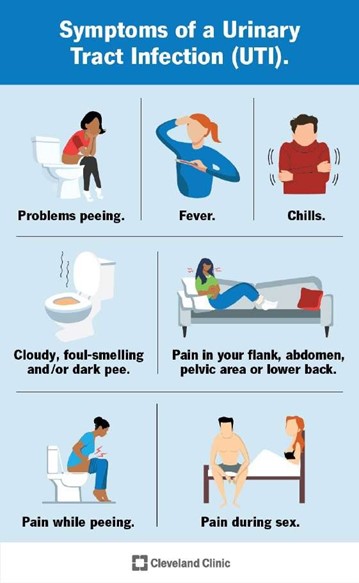The client has just undergone surgery for bladder cancer and has an indwelling urinary catheter.
The nurse should monitor for which of the following complications?
Urinary retention.
Urinary incontinence.
Urinary tract infection.
Urinary urgency.
The Correct Answer is C
A urinary tract infection (UTI) is a common complication after bladder cancer surgery, especially if the patient has an indwelling urinary catheter.
A UTI can cause symptoms such as fever, pain, burning or urgency when urinating, blood in the urine, or cloudy or foul-smelling urine.
Choice A is wrong because urinary retention (the inability to empty the bladder completely) is unlikely to occur with an indwelling catheter, which drains urine continuously.
Choice B is wrong because urinary incontinence (the loss of bladder control) is more likely to occur after partial or radical cystectomy, which remove part or all of the bladder, respectively.
In these cases, reconstructive surgery is needed to create a new way for urine to leave the body.
Choice D is wrong because urinary urgency (the sudden and strong need to urinate) is also more likely to occur after partial or radical cystectomy, which can affect the nerves and muscles that control urination.
Urinary urgency can also be a symptom of a UTI, but it’s not the only one.
Nursing Test Bank
Naxlex Comprehensive Predictor Exams
Related Questions
Correct Answer is C
Explanation
Dysuria, which means pain or a burning sensation when peeing, is a common symptom of urinary tract infection (UTI).

UTIs are caused by bacteria entering the urinary tract through the urethra and spreading to the bladder or kidneys.
Choice A is wrong because nausea is not a specific symptom of UTI, although it may occur if the infection spreads to the kidneys.
Choice B is wrong because diarrhea is not a symptom of UTI, but rather a condition that affects the digestive system.
Choice D is wrong because constipation is also not a symptom of UTI, but a problem with bowel movements.
Normal ranges for urine tests vary depending on the type of test and the laboratory that performs it.
However, some general ranges are:
Specific gravity: 1.005 to 1.030
pH: 4.6 to 8.0
Protein: less than 150 mg/dL Glucose: less than 130 mg/dL Ketones: none
Blood: none Nitrites: none
Leukocyte esterase: none Bacteria: none or few
White blood cells: less than 5 per high-power field Red blood cells: less than 3 per high-power field Epithelial cells: few
Correct Answer is C
Explanation
This is because intravenous potassium supplementation is indicated for patients with profound hypokalemia (plasma K+ <2.5 mmol/L) or cardiac arrhythmia. The rate of infusion should not exceed 10 mmol/hour to prevent complications such as hyperkalemia, cardiac arrhythmias, and phlebitis.
Choice A is wrong because monitoring urine output every 8 hours is not sufficient to prevent complications from intravenous potassium replacement therapy.
Urine output should be monitored more frequently (at least every 4 hours) to assess renal function and fluid balance.
Choice B is wrong because administering potassium via a bolus injection is dangerous and can cause fatal cardiac arrhythmias.
Potassium should never be given by intravenous push or intramuscular injection.
Choice D is wrong because encouraging the client to eat potassium-rich foods is not appropriate for patients receiving intravenous potassium replacement therapy.
Oral potassium supplementation is preferred for patients with mild to moderate hypokalemia (plasma K+ 2.5-3.5 mmol/L) who can eat and absorb oral potassium.
Potassium-rich foods include potatoes, legumes, juices, seafood, leafy greens, dairy, tomatoes and bananas.
Whether you are a student looking to ace your exams or a practicing nurse seeking to enhance your expertise , our nursing education contents will empower you with the confidence and competence to make a difference in the lives of patients and become a respected leader in the healthcare field.
Visit Naxlex, invest in your future and unlock endless possibilities with our unparalleled nursing education contents today
Report Wrong Answer on the Current Question
Do you disagree with the answer? If yes, what is your expected answer? Explain.
Kindly be descriptive with the issue you are facing.
